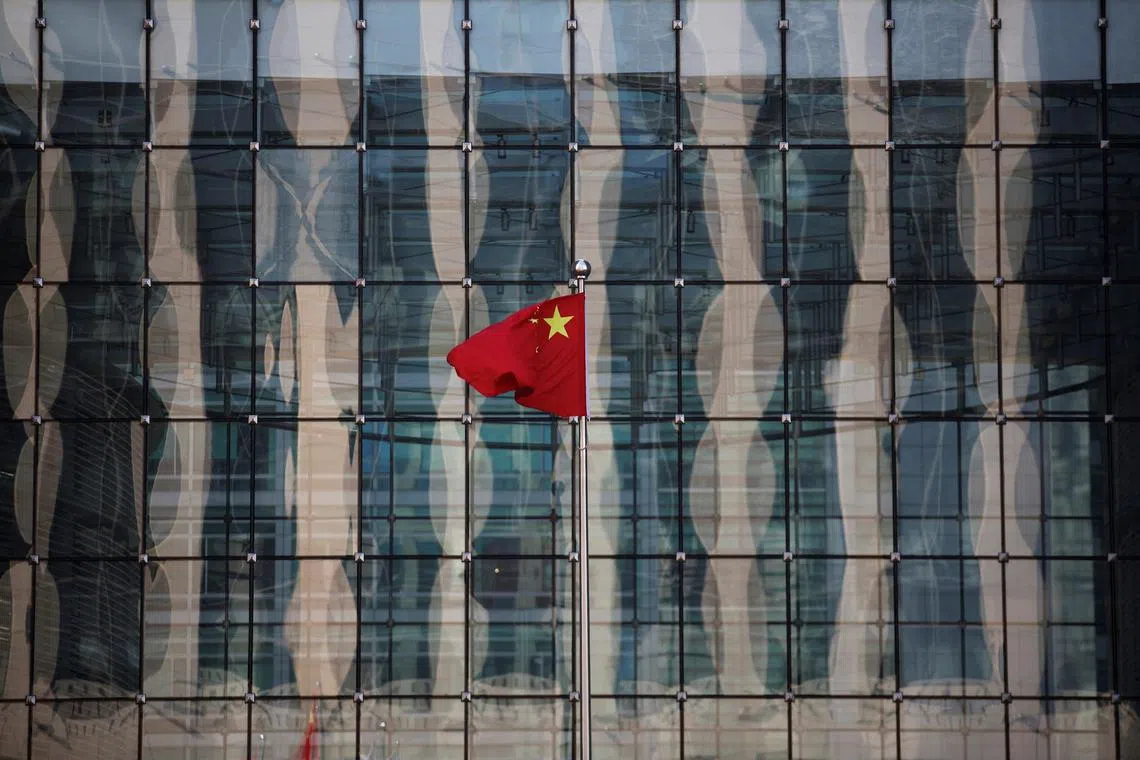China weighs stock market rescue package backed by $378.2 billion
Sign up now: Get ST's newsletters delivered to your inbox

The stabilisation deliberations underscore the elevated level of urgency among the Chinese authorities to stem a sell-off that sent the benchmark CSI 300 Index to a five-year low this week.
PHOTO: REUTERS
SHANGHAI – The Chinese authorities are considering a package of measures to stabilise the slumping stock market, according to people familiar with the matter, after earlier attempts to restore investor confidence fell short and prompted Premier Li Qiang to call for “forceful” steps.
Policymakers are seeking to mobilise about 2 trillion yuan (S$378.2 billion), mainly from the offshore accounts of Chinese state-owned enterprises, as part of a stabilisation fund to buy shares onshore through the Hong Kong exchange link, said the people.
They have also earmarked at least 300 billion yuan of local funds to invest in onshore shares through China Securities Finance Corp or Central Huijin Investment, the people added.
Officials are also weighing other options and may announce some of them as soon as this week if approved by the top leadership, the people said. The plans are still subject to change. The China Securities Regulatory Commission did not respond to a request for comment.
The deliberations underscore the elevated level of urgency among the Chinese authorities to stem a sell-off that sent the benchmark CSI 300 Index to a five-year low this week. Calming the nation’s retail investors, many of whom have been bruised by the protracted property downturn, is also seen as key to maintaining social stability.
Whether such measures will be enough to end the rout is far from certain. The property crisis, depressed consumer sentiment, tumbling foreign investment and diminished confidence among local businesses after years of volatile policymaking are exerting strong downward pressure on both the economy and financial markets.
Past efforts to shore up the stock market, most notably in 2015, proved insufficient at best and at times counterproductive. The authorities have also been reluctant to roll out major economic stimulus of the sort that many equity investors have called for.
At a State Council meeting on Jan 22, chaired by Premier Li, the Cabinet received a briefing on the operations of the capital markets and considerations for related work, according to an official statement, which did not provide more details on what Beijing is mulling over.
“It sounds like something had been readied in response to the recent equity rout,” said Mr Neo Wang, managing director for China research at Evercore ISI in New York. “The market was poor enough to warrant such elevated attention – China cannot afford to see A-shares sinking towards the Lunar New Year holidays,” he said, referring to domestically listed Chinese stocks and the upcoming mid-February break.
More than US$6 trillion (S$8 trillion) has been wiped out from the market value of Chinese and Hong Kong stocks
Confidence in China’s markets has been hurt over the past years by President Xi Jinping’s growing control over private enterprise, which has included a crackdown on the country’s tech giants. International banks which were planning a massive expansion in the country are now tempering their ambitions to build platforms in the world’s second-largest economy.
During the 2015 rout, Beijing tapped China Securities Finance as its main stabilisation vehicle by allowing it to access as much as 3 trillion yuan of borrowed funds from sources, including the central bank and commercial lenders. The money was used to buy stocks directly and provide liquidity to brokerages. Even so, the turbulence did not end until a year later.
This time, officials are seeking to use offshore money to minimise impact on an already-weakening renminbi, said the people.
China’s stock meltdown is adding pressure on so-called “snowball” derivatives, which are structured products that promise bond-like coupons as long as the underlying assets trade within a certain range.
The CSI Smallcap 500 Index, a pricing reference for some of these products, slipped 4.7 per cent on Jan 22, taking it below an earlier estimated threshold that may trigger widespread losses on the snowballs.
The nation’s largest brokerage, Citic Securities, last week stopped short-selling services for some clients after so-called “window guidance” from regulators. BLOOMBERG


